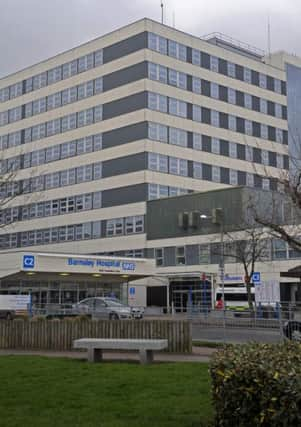Family’s anger as coroner rules hospital neglect played role in Barnsley patient’s death


An eight day inquest found that neglect by Barnsley Hospital had played a part in Eileen Reynolds’ dying on March 30 last year.
Doctors who admitted mistakes to the hearing said this was because of staffing issues and high workload. However the coroner ruled they were individual errors and there was no evidence more staff would have prevented them.
Advertisement
Hide AdAdvertisement
Hide AdThe family’s solicitors, Raleys, have confirmed they plan to take legal action against the hospital and were confident of this being successfully resolved in light of the inquest verdict.
Mrs Reynolds had been admitted a week before she died with gout and renal failure. In a narrative verdict assistant coroner Louise Slater said during her time in hospital Mrs Reynolds developed hyperkalaemia - high potassium in her blood - which was not recognised or treated appropriately.
The coroner highlighted errors in Mrs Reynolds treatment by junior doctors - who blamed mistakes on their workload - and nursing staff.
However she said she could not find evidence that the number of junior doctors on ward 27 where the patient was treated had fallen below the minimum requirement or that more staff would have prevented the errors.
Advertisement
Hide AdAdvertisement
Hide AdIn the coroner’s finding of facts she said one doctor had admitted making several errors in relation to Mrs Reynolds care after blood tests showed a low potassium level. She said the doctor had “failed to check all the prescription cards and therefore dual prescribing of intravenous and oral potassium”. The doctor told the inquest errors were made because of understaffing on ward 27 which senior management at the hospital were aware of.
The day before Mrs Reynolds died her daughter Julie noticed she was out of breath. As a result another doctor carried out blood tests but failed to spot that they were “grossly abnormal” with high levels of potassium.
The coroner said these results required immediate action. Her findings also accepted evidence that if “Mrs Reynolds had received timely and active management then her death would have been avoided.”
The inquest findings also highlight failings in the nursing care Mrs Reynolds received during the night before her death. She said “an early warning score” around four hours before she died was miscalculated meaning she was deemed to be at a lower risk than she actually was. Had this been done correctly Mrs Reynolds’ care would have been escalated. However when the night team passed over to the morning shift no concerns were raised about Mrs Reynolds. Concerns were raised at 8am and she died at 9.43am.
Advertisement
Hide AdAdvertisement
Hide AdBarnsley Hospital Trust’s medical director Dr Richard Jenkins has apologised to her family for the deficiencies in her care. He said: “The trust had undertaken an investigation into Mrs Reynolds care prior to the inquest but we will carefully study the coroner’s findings to ensure that all necessary steps have been taken to prevent a similar situation from arising in future.”
Mrs Reynolds children Julie, Alan and Susan said: “As a family we feel that these poor levels of service provision not only contributed to the ultimate death of our mother, but also led to sub-optimal standards of medical and nursing care to other patients on that ward.”
Matthew Brown, medical negligence specialist with Raleys Solicitors, said: “I can confirm that we are representing the family in a medical negligence civil claim against the trust, and in light of the Coroner’s comments and findings today we hope to bring the case to a satisfactory conclusion soon.”